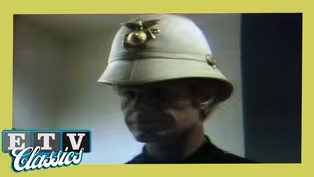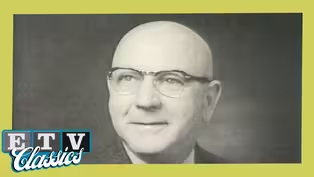ETV Classics
U.S.S. South Carolina | Carolina Journal (1984)
Season 15 Episode 22 | 28m 54sVideo has Closed Captions
Michael Collins goes aboard the missile cruiser U.S.S. South Carolina as it visits its namesake.
In this episode of Carolina Journal, we find our host Michael Collins aboard the nuclear powered missile cruiser, the U.S.S. South Carolina as it pays a visit to its namesake on October 9, 1984. The ship was first commissioned on January 25, 1975, and our host describes the majestic ship’s arrival in Charleston on a cool fall morning with flags flying and sailors in their dress whites.
Problems playing video? | Closed Captioning Feedback
Problems playing video? | Closed Captioning Feedback
ETV Classics is a local public television program presented by SCETV
Support for this program is provided by The ETV Endowment of South Carolina.
ETV Classics
U.S.S. South Carolina | Carolina Journal (1984)
Season 15 Episode 22 | 28m 54sVideo has Closed Captions
In this episode of Carolina Journal, we find our host Michael Collins aboard the nuclear powered missile cruiser, the U.S.S. South Carolina as it pays a visit to its namesake on October 9, 1984. The ship was first commissioned on January 25, 1975, and our host describes the majestic ship’s arrival in Charleston on a cool fall morning with flags flying and sailors in their dress whites.
Problems playing video? | Closed Captioning Feedback
How to Watch ETV Classics
ETV Classics is available to stream on pbs.org and the free PBS App, available on iPhone, Apple TV, Android TV, Android smartphones, Amazon Fire TV, Amazon Fire Tablet, Roku, Samsung Smart TV, and Vizio.
Providing Support for PBS.org
Learn Moreabout PBS online sponsorshipMore from This Collection
Find classic news and public affairs programming from South Carolina ETV.
Open Line: Carolina to Shanxi (1980)
Video has Closed Captions
An exchange program for higher education between USC and the people of China's Shanxi Province. (28m 51s)
Charleston Place | Carolina Journal (1986)
Video has Closed Captions
This edition of "Carolina Journal" revisits the opening of the Charleston Place complex. (27m 20s)
Strom Thurmond Remembered (2003)
Video has Closed Captions
Charles Bierbauer reviews the life and accomplishments of South Carolina Senator Strom Thurmond. (1h 51m 22s)
Strom Thurmond At The Seat of Power (1982)
Video has Closed Captions
The documentary follows the life and career of Strom Thurmond. (29m 49s)
Profile: The Senator from Barnwell: Edgar A. Brown (1967)
Video has Closed Captions
A visit with the venerable Edgar A. Brown in his law office, home, and the streets of his hometown. (14m 42s)
A Conversation with Justice Ernest Finney, Jr.: A Lifetime of Success (2000)
Video has Closed Captions
The honorable Judge Ernest A. Finney, Jr. discusses his life, career, and legacy in SC's lawfare. (27m 47s)
Profile: Senator John Drummond of Ninety-Six | The Big Picture (2008)
Video has Closed Captions
The life and times of Senator John Drummond of Greenwood, South Carolina. (26m 53s)
Video has Closed Captions
The memoirs of three businessmen who attribute their successes to their time in the US Marine Corps. (28m 54s)
The Governors' Roundtable | Carolina Journal (1989)
Video has Closed Captions
A round-table discussion with nine men who served as governor of the state of South Carolina. (57m 54s)
Elie Wiesel | Solomon Tenenbaum Lectureship in Jewish Studies (2006)
Video has Closed Captions
Professor Elie Wiesel, first Nobel laureate delivers a lecture as a part of the Tenenbaum series. (1h 17m 18s)
Solomon Blatt: Speaker Emeritus of the SC House | Carolina Journal (1985)
Video has Closed Captions
The life and career of Solomon Blatt, Speaker Emeritus of the S.C. House of Representatives. (27m 49s)
Remembering Bill Moyers: War in the Gulf - Town Meeting (1991)
Video has Closed Captions
Bill Moyers, who died June 26, 2025, was an award-winning journalist and PBS host. (59m 32s)
Providing Support for PBS.org
Learn Moreabout PBS online sponsorshipAnnouncer> The following program was made possible in part through viewer contributions to the ETV Endowment of South Carolina.
A production of the South Carolina Educational Television Network.
♪ Mike Collins> October 9th, 1984.
The nuclear powered missile cruiser the USS South Carolina pays its first visit to its namesake in nine years, the second since the ship was commissioned on January 25th, 1975.
The powerful majestic warship arrived at Charleston Harbor on a beautiful, cool fall morning with flags flying and sailors in their dress whites lining the rail.
The ship passed slowly out of the twin spans of the Cooper River Bridge, its superstructure clearing the bridge by a mere two feet.
Capt.
Sydow> Since the ship is named for the state of South Carolina, and the ship has not visited the state of South Carolina since shortly after it was commissioned in January of 1975.
I thought it was about time that we went back and revisited our namesake state and tried to establish some ties and contacts with the people in the state.
Mike> This is the story of the USS South Carolina , its men, its mission, and its trip home.
♪ ♪ Sunday, October 7th.
Liberty boats bring the last few members of the South Carolina's crew back from Nassau.
Because the USS South Carolina is nuclear powered, she is not permitted to dock in the harbor at Nassau.
The only way on or off the ship is on small boats.
All men on board, the 596 foot cruiser is ready to get underway.
(indistinct chatter) (indistinct chatter) ♪ Sailing ♪ ♪ takes me away ♪ to where ♪ ♪ I've always ♪ heard it could be ♪ ♪ ♪ Just a dream and the wind ♪ to carry me ♪ ♪ Soon I will be free ♪ ♪ (indistinct chatter) ♪ ♪ Capt.
Sydow> USS South Carolina is... has several missions, one of which is anti-air warfare.
Another would be anti-submarine warfare.
Another would be anti-surface warfare.
And each of these, in most cases, would be interwoven into its functions as a ship, part of a battlegroup.
Even though we will be more uncomfortable after we make the turn we should pick up some speed.
Mike> I've been talking to people around the ship and almost to a man, people have said that one thing about this ship that is really very good is the captain.
They all say that this is a much better command than they've been under in the past.
Why do you think that is?
What do you do that is so special?
Capt.
Sydow> I don't really know.
I haven't done anything differently here than I've done anywhere else in my career.
I try to... to obviously stay abreast of what's going on throughout the ship.
I try to get around the ship, frequently.
See people where they work.
I try to keep the crew informed.
I like to talk on the announcing system.
You may have noticed that since you've been here.
I might get on the announcing system a couple, three times a day when the ship is underway, just to let the crew know what's going on when there are things that I think are of interest to them, generally.
Good morning, this is the captain.
We, have commenced our transit now to Charleston.
Now that we've secured from the... As I'm sure everyone noticed through the night and those who were topside this morning, we do have, some fairly rough seas and high winds.
During the night last night, a new tropical storm developed.
It's about 300 to a little over 300 miles to the east of us right now.
And its predicted track is, about the same as ours.
So, if it, continues to move as predicted, it's going to follow us up towards Charleston.
One group in particular that I want to recognize this morning for their performance during the three days that we spent here.
They got little, if any opportunity to see any of Nassau.
And that's the boat crews.
The only reason the people who did get some good liberty were able to do so is because the boat crews are willing to put up with the weather... and the hassle of operating the boats from the ship to the beach and back.
And I want to extend to them my personal well done and appreciation for the hard work that they put in.
As a small compensation to the boat crews, I'm authorizing a special 72 hour liberty for them when we get back to Norfolk.
Details to be worked out, through their change of command with the X.O.
Mike> Time at sea is spent training, keeping the ship and its 40 officers and 550 enlisted men ready to respond should the need arise.
Modern technology made this ship able to operate independently or in combination with other ships, planes, or submarines.
596 feet long, the USS South Carolina is propelled by two nuclear reactors at speeds of more than 30 knots.
She's been in service since January 1975 and has yet to be refueled.
This enables her to spend indefinite periods of time at sea.
Supplies can be airlifted or brought in by other ships.
While at sea, she is a floating fortress of state of the art weaponry.
Capt.
Sydow> South Carolina's weapon systems are state of the art.
They are the most modern that the U.S. Navy has, currently.
Mike> Among the weapons on deck are two computer controlled Phalanx close-in weapon systems capable of firing 3000 rounds of ammunition per minute, and two five-inch guns.
> When we put a 70 pound, 70 pound projectile out 16 to 20 times a minute.
We can go 12 miles or 20 miles, depending upon what target we're going to shoot at.
Mike> What kind of destruction per shell?
> 100 square meters every time it hits.
It'll get anything that's in there.
Mike> The two guns are capable of firing 40 rounds per minute on a target.
The guns are radar guided and operated by a man who sits at a console that looks like it belongs in a Star Wars movie.
Edward> He's going to monitor all, everything that happens in there, all sequences.
If he sees there's something wrong, he can stop before something bad happens.
Mike> Four decks below, the shells are fed to the gun.
Edward> They're loaded up into the cradle, the cradle swings up, the round is rammed into the breach, the breach closes.
We're ready for a firing order It goes boom!
The gun recoils.
Empty case comes out of the breach, is thrown 90 degrees and chucked over the side automatically.
♪ ♪ ♪ On average we shoot three or four times a week.
We're just coming out of refresher training.
With this gun here, we just shot 131 rounds last week.
Before, we shot 150 rounds.
All the time.
Got to keep them loose.
Mike> The South Carolina also has one anti-submarine rocket launcher, torpedoes and two Tarter missile launchers.
Edward> This is the most advanced missile system the Navy's got.
Mike> The missiles have a range of 25 miles and can reach a target in 45 to 50 seconds.
Edward> What we'll do is we'll lighter off and we'll step load a missile for you.
We'll twirl it around, and we'll take it back down.
Okay?
We got to start, just like a car.
♪ Okay, loading her up.
♪ Now we'll bring her up out of the hole.
♪ She's on a launcher.
She's locked in place.
Okay.
She's locked in place.
Will identify it.
These indications tell me that I have a good missile on there.
That I know what it is.
And I can go ahead and play with it or shoot it.
Mike> In computer terms, if the ship and its weapons are hardware, then the software is the South Carolina's men, for it is the men that make it all work.
> We have some of the best people, I think, in the country, in the military.
They are smart, young, eager.
Many of them are very aggressive and could do very well on the outside, but have chosen the Navy at least for a few years, if not for a career.
> The typical average sailor is the worker bee.
He's the guy who makes it all happen.
He does a great majority of the manual labor on board the ship.
In fact, he does all the manual labor on board the ship.
As in any company, the chiefs are the managers and the standard sailor is the worker bee.
Mike> Of the chiefs on board the South Carolina one is a South Carolinian.
Chief Petty Officer William Rollinger, lives in Summerville.
For him, the ship's visit is a trip home.
> For me, it's a chance to... spend some time with my family.
For many in the crew, it'll be their first opportunity to visit in Charleston or in South Carolina at all.
It's an opportunity to, you know, typical sailor attitude, see and do new things.
Mike> Chief Rollinger is in charge of sonar, the heart of the USS South Carolina's anti-submarine warfare system.
The information he and his men collect is fed to the ship's weapons systems to guide them to the target.
Down through history, chiefs in the Navy have always been portrayed as salty dogs with... a bark maybe worse than their bite.
But you never can tell.
Is that how you operate here?
Chief Rollinger> Some of my troops would probably say "yes."
Most of them, I hope, would say "no."
I don't tend to, bark any more than I bite.
I like to deal with my people directly, and that I use what I refer to as positive leadership rather than negative, dictation.
I prefer to deal with them in a more... formative manner.
Mike> The chief is one of several South Carolinians on board.
Being in the Navy doesn't seem so unusual for Mike Bedenbaugh, even if he is from landlocked Prosperity.
> Well, it's just, 20 miles from the recruiting office in Columbia.
So I just rode down there- Mike> How long have you been in?
> For two and a half years.
Mike> But being on board the South Carolina is special.
Bedenbaugh> I asked for it.
I asked for it since it was the South Carolina.
And, when I got out of school, you know, we had a list and a sheet and I sat there and said- well, you know I thought it would be a neat idea to do it.
So I did it and I got it.
Mike> And there he is, on board one of the most powerful and sophisticated ships ever to sail the seas as part of the South Carolina's Navigation Division.
Bedenbaugh> And basically what our job is, is to, upkeep the navigational charts, the publications, the... you know, keep up with the ship's track, keep up with ship's deck log captain's deck log, and... honors and ceremonies associated with the ship and visiting dignitaries.
Mike> It's a lot of paperwork then for you?
<It is.> But occasionally you get to stand watch.
Bedenbaugh> Oh, yeah.
We stand and watch.
As it is now, we have, two people under instruction and three people on that's qualified to stand and watch it sail.
And we stand, three section watches with five hours on and ten off.
Mike> What does that mean?
Stand and watch, what do you do?
Bedenbaugh> Well, stand up here with the... at the desk up here, and keep up the plot.
Keep up where the ship is using whatever we have to use electronic or celestial or whatever, and, assist officer of the deck and keep the ship where it's supposed to be.
Basically it.
Bottom line.
Mike> But the bottom line for most people is how they feel about their jobs.
Mike takes a pragmatic view of life in the Navy.
Bedenbaugh> Well, it's something to do.
I mean, we don't have this in Prosperity, so.
Mike> What's the best part about the job?
And what's the worst part about the job?
Bedenbaugh> Best part is being to do things I don't know, differently.
The... it's not monotonous, a lot of times.
You know, sometimes it is, but most of the time it's always something thrown at you that, you know, you got to come back or fall back one of the other.
Mike> What's the bad side of it?
Is there a bad side?
Bedenbaugh> Well, oh yeah, (laughter) But you know, that's... there's a bad side to everything though.
Mike> Seaman Christopher Lee Smith is from Greenville.
> I'm in the operations department.
We, preserve and beautify the ship.
We steer the ship during underway periods, when we're in port we drive Liberty boats.
Mike> Is it difficult to steer the ship?
This is a mighty big ship.
Christopher> Not really.
At least I don't have any problem.
Mike> Smith has served on the South Carolina for 8 of his 14 months in the Navy.
His presence on board is just happenstance, but he likes his life in the Navy.
Christopher> It's pretty good.
It's a good ship.
It's, a nuclear powered cruiser.
Mike> What makes it, what makes it a good ship?
Christopher> The people on board.
Definitely the people on board.
Mike> It's not like this on every ship in the Navy?
Christopher> No, not at all.
Mike> What do you suppose makes it this way?
Why are they so- How did you luck out to get good people on this ship?
Christopher> I don't know, it's just...
It's just like we have a unison.
We're all like a big family on the whole ship.
Mike> To Smith, the camaraderie on board the SOCAR is a plus.
But there is another plus to Navy life in general.
Christopher> I guess it's the travel, the adventure.
Seeing something new every day.
I'll never see the same thing every day.
Mike> You don't mind bunking with 50 other guys- Christopher> Not really.
Mike> Taking Navy showers?
Christopher> Not really.
Mike> Eating Navy food?
<No> Would you do it again?
Would you enlist again?
Christopher> No I wouldn't.
Mike> Would you do it again?
Would you enlist for the first time, again?
Bedenbaugh> I don't regret enlisting the first time.
But if the second time goes, that's two years away, and I'll worry about that when I get there.
Mike> Dale Richmond from Goose Creek, is leaving the Navy after eight years, working with nuclear power plants on submarines and on the South Carolina .
A difficult life, but one he's enjoyed.
To him, the good things of Navy life blend in with the bad.
> The best thing about the Navy, it's about one in the same.
The best thing about the Navy is the people.
There's some excellent people in the Navy.
And, the worst thing is... the hardest thing is learning to put up with them learning to get along with everybody.
It's pretty difficult sometimes.
Capt.
Sydow> The people is what makes the Navy the most enjoyable.
Mike> What makes a good sailor?
> What makes a good sailor?
It's, it's I think like any other job in life.
And that to be a good sailor, you have to enjoy what you're doing.
And there's a lot of kids out there who just want to get involved for four years and see part of the world and do some hard things, but also have some fun doing it and meet new people.
Some people just love getting away, being at sea, the hard work, those sort of things.
> Well, hopefully they take away, first of all, an increased level of maturity from when they, came into the Navy.
Many of them enlist in the Navy, right out of high school or maybe even perhaps without having finished high school.
And so they have not yet reached a, substantial level of maturity.
So hopefully that's one thing they take away.
Another is, a greater measure of self-discipline.
Based on the... things that they have been required to do while they were in the service.
Hopefully that they have received training in an area regardless of what that area is, some more technical than others, but training that they can apply... to a career once they leave the Navy, if that's what they decide to do.
Lt. Cmdr.
Murray> You have to look at the Navy like a company that would offer some unique experiences.
The good people will continue to improve and to move up and continue to get promotions like any other company.
And in a year from now, there'll be someone in the wings waiting to relieve me.
Mike> The Navy may be a company, but it's also a way of life, particularly while on board ship.
The South Carolina is literally a floating city with workers from all walks of life practicing different careers, working together, sleeping together, and eating together.
They have a ship store.
Customer> Out of Winstons.
Clerk> Is that it?
Customer> Yeah.
Clerk> Four dollars.
Mike> With everything from cigarettes and toiletries to cassette tapes.
WSOC is on board.
That is the South Carolina's own television and radio station.
DJ> You're listening to Armed Forces Radio WSOC, broadcasting daily from the basement of the USS South Carolina .
I'm Navy journalist Joseph Bland and this is a little bit of Billy Joel on WSOC Armed Forces Radio.
♪ Mike> The ship's medical facilities are by necessity, fairly extensive.
Paul> Well, we've done everything from sewing up some minor lacerations to some major trauma.
We have the capabilities of supporting a cardiac arrest or respiratory arrest, should that occur.
We have casting capabilities, but we haven't really gotten into that.
Most of our stuff is just dealing with colds, headaches, bumps, bruises, sprained ankles- Mike> And seasickness.
Paul> And lots of seasickness.
Mike> Do you ever get seasick?
> Right now, I'm a little queasy myself.
We had a, respond to a little emergency up on the forward part of the ship.
A guy got his hand caught in the door, and, you can really feel the ride up there.
And I hadn't taken anything prior to that, so I got a little nauseous.
Mike> I would think, that the way the ship tosses and turns in the surf sometime, that it can get a little treacherous in these hallways with pipes exposed and bulkheads that are made out of steel and things like that.
Are there a lot of injuries on the ship?
Paul> A lot of the guys try to be real careful.
Most of us are getting kind of the hang of walking on the ship after spending some time off in the Vacapes.
There isn't too much in the way of real serious injuries.
People slipping on wet decks more than just the ship tossing and turning.
Mike> Tossing and turning is really a factor at meal time.
You have to hold on to your food in rough seas or it's liable to be on the floor.
Meals are the source of life, and the USS South Carolina serves over 1800 of them every day.
Last night we had steak.
Tonight we're having veal.
How many pieces of steak and veal do you go through in the course of a meal?
> We go through about, say, 3 or 400 pieces of steak, about 200 pieces of veal.
Mike> How long does it take to cook all that stuff?
Jimmy> About two hours.
Mike> Obviously, you're cooking a steak- dinners at 5:30, you start at 3:30, what happens to the piece of meat you cooked at 3:30?
Jimmy> Well done.
(laughter) Mike> Obviously not gourmet food, but certainly nourishing and definitely filling.
The bread and rolls and cakes and pies are made fresh each day on board the ship.
In this part of the ship, if you couldn't feel the motion of the ocean and the constant rumble of the engines, you might think you were in a typical bakery.
Cooking at sea, particularly when it's rough, is no easy task, but you adapt.
Jimmy> It's pretty slippery.
You have to hang on all the time.
Mike> Ever get hurt?
Jimmy> Not really.
Not on the ship, I haven't.
Mike> How do you keep boiling water from toppling over on you and things like that?
Jimmy> We got lids to keep it shut.
Mike> You like this job?
Jimmy> Oh, yeah, I love it.
Mike> Is the food good?
Jimmy> Yeah.
> I've only been in for four months, so I really don't know a whole lot yet.
Mike> How's the food?
Steve> It's good.
Mike> What did you have tonight?
Steve> I had liver and onions, rice and gravy.
Shortcake.
Mike> Have you been on other ships besides the South Carolina ?
> Nah, that's it.
Mike> So you have nothing to compare this food to, do you?
Mike> How is the food?
Doug> It's terrible.
(laughter) Mike> William Lawing works in the mess hall, so his perspective may be different.
> I wash the dishes, I help, serve the meal.
And I make sure that, EDF is kept clean.
Mike> How is life in the Navy?
William> It's exciting.
If you have a family, you know, which I'm married and it has done a lot for my family.
And then, it's an adventure too, also.
Mike> How does your wife feel about you being away so often, at sea?
William> She have her doubts at times.
But she knows that everything- It's just like a job.
I have to be away.
Mike> Do you miss her cooking?
William> Very much.
Very much.
Mike> In a word, how's the food here?
William> It's... how can I describe it.
Well, I can't say in a word, but it gets you by.
Mike> The men's off hours are spent playing cards and other games, watching television or sleeping.
The berthing areas serve as sleeping and recreation areas.
So sleeping is quite a feat.
To civilians, it doesn't look terribly comfortable, but to these men, it's home.
Melvin Grubbs is 21 and has been in the Navy for two and a half years.
Has it grown on you, was it what you expected it to be?
<No> What did you expect?
> Well, I thought the nuclear field would be a little bit more exciting than it is, but it's not.
Mike> What's an E-5 do?
Melvin> Basically, we're... no, we don't do that much.
We're... the bottom of the totem pole in the engine rooms.
We do all the cleaning and stuff like that.
Mike> What is it like?
How many people sleep in this room?
<47> What's it like sleeping with 46 other guys?
(laughter) Melvin> If half of them were females, it'd be all right.
It's not too nice, sleeping with a lot of guys because you get up and smell all the dirty underwear.
(laughter) Danny Roberge is a five year veteran and works with the ship's nuclear plant.
> The best thing about the Navy is the training.
Probably one of the worst things is... a lot of long hours.
And... hard work, a lot of sweating in the plant.
Mike> Do you plan to, make this a career?
Danny> I'm considering it.
Mike> They tell me that you're the boss.
If you're the boss, how come you're sleeping in the bottom bunk here?
> Well, I like down in the bottom a lot better.
It's just, up there... it's not good.
Mike> But there are two bunks above you.
You ever get claustrophobic down here?
Donald> Oh, no.
It's a lot of privacy down here.
It's just, you don't fall as far in rough seas.
And if I want to throw something behind here, it just goes back.
Mike> Privacy.
There is something we haven't really touched on.
Where, there's 500 some people on this ship.
Where do you go to be alone?
Donald> You close the curtains and put a Walkman on and read letters from home.
That's your privacy.
Mike> How long did it take you to become accustomed to being able to sleep amid television and conversation, and the ship rocking and the whistle going off with announcements all the time?
(laughter) Donald> Geez...
I don't know, I just got used to it after a while.
After a while, you just put it out of your mind.
I've been on here five years- On here... over three years, five months, and after a while it's just, you get used to the rocking and the rolling and the lights and the people and... it's just nothing, after a while.
Mike> What's your day like?
Donald> My day like?
My day is pretty long.
It's, usually 3:30 in the morning.
At least it is this week, to... to about 5:00 in the evening.
Then after that I get back up.
It's just down in the plant to work, and, when I'm off I come back and go to sleep.
Mike> Donald Keeler has decided not to stay in the Navy, why?
Donald> Basically, what anyone else has been saying, really long hours, a lot of sweating, no recognition, and it's the same old job.
I'm basically at the top where I can't go any further.
All I can do is just supervise and do the same thing over and over again.
It's just...
I've put in 12 hours a day down in the plant, and all I can do is paint or clean or supervise.
After a while it gets boring.
No sunshine doesn't work either.
Mike> The travel and adventure of the Navy is balanced by the everyday work because like any other occupation, eventually it becomes a job.
However, there is something extra that goes along with life in the Navy.
What other job would include the pomp and circumstance of 500 men in their dress whites lining the rail of one of the world's most powerful ships.
As she pulls into Charleston Harbor for a ceremonial visit to her namesake state.
Tuesday, October 9th, 1984.
The USS South Carolina docks at the Charleston Naval Base.
For most of the crew, it's a chance for some well-earned shore leave.
But for both the USS South Carolina and her crewmen from South Carolina, it's a welcome visit home.
♪ In my mind ♪ I'm going to Carolina ♪ ♪ ♪ Can't you see the sunshine ♪ ♪ Can't you just feel ♪ the moonshine?
♪ ♪ Ain't it just like ♪ a friend of mine ♪ ♪ to hit me from behind ♪ ♪ Yes, I'm going to Carolina ♪ in my mind ♪ ♪ ♪ Karen, she's the silver sun ♪ ♪ You best walk her way ♪ ♪ and watch it shine ♪ ♪ Watch her ♪ ♪ Watch the morning come ♪ ♪ ♪ A silver tear appearing now ♪ ♪ I'm crying ain't I ♪ ♪ ♪ Going to Carolina ♪ ♪ in my mind ♪ ♪ ♪ In my mind ♪ I'm going to Carolina ♪ ♪ ♪ Can't you see the sunshine ♪ ♪ Can't you just feel ♪ the moonshine ♪ ♪ Ain't it just like ♪ a friend of mine ♪ ♪ to hit me from behind ♪ ♪ Yes, I'm going to Carolina ♪ ♪ in my mind ♪ ♪ ♪ Going to Carolina ♪ in my mind ♪ ♪ ♪ And I'm going to Carolina ♪ ♪ in my mind ♪ ♪ ♪ Going to Carolina ♪ ♪ in my mind ♪ ♪ ♪
Support for PBS provided by:
ETV Classics is a local public television program presented by SCETV
Support for this program is provided by The ETV Endowment of South Carolina.

























